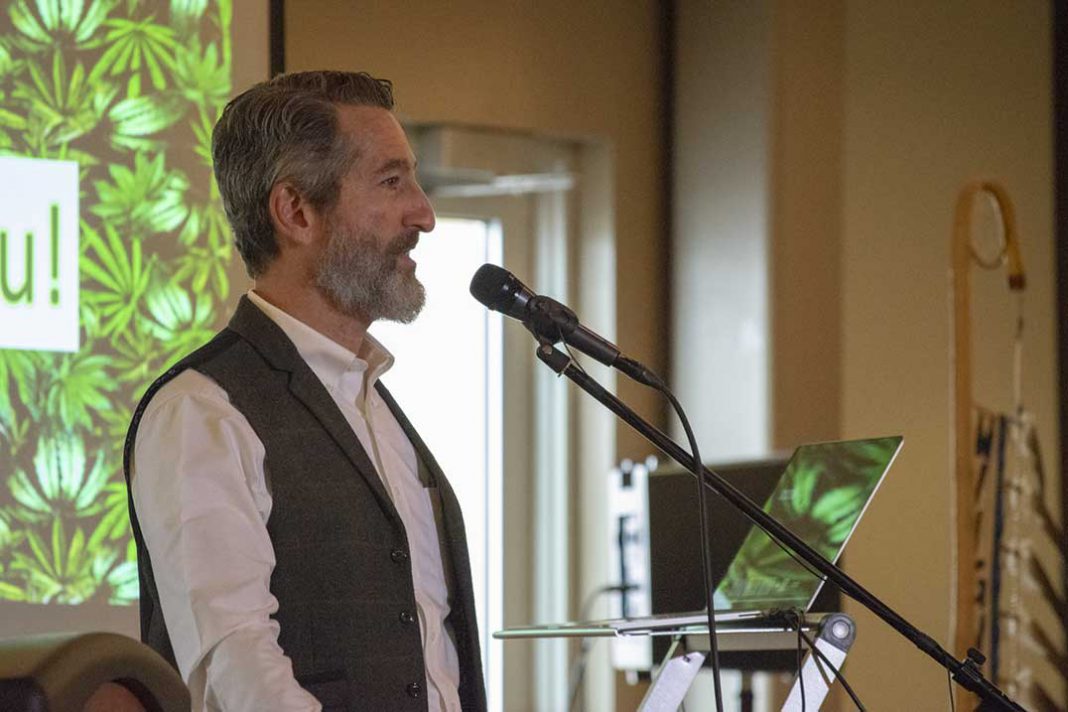LITTLE CURRENT—Whitefish River First Nation (WRFN)’s chief and council held a conference and discussion forum at Manitoulin Hotel and Conference Centre this past weekend to better prepare its residents for the legalization of cannabis.
“We’re trying to separate the fiction from the facts and help council craft the next steps,” said WRFN Ogimaa Shining Turtle.
He said the conference was motivated by a series of events in the WRFN community earlier this year. An individual announced they would be opening up a cannabis retail outlet on the reserve, a declaration that took the chief and council by surprise as they were not consulted, nor had they given permission to the individual. After a strong public response on both sides of the issue, council passed a moratorium on cannabis retail outlets on the reserve until further notice.
Ogimaa Shining Turtle says his community does not yet have all the information it needs to make decisions such as these, which will have wide-reaching impacts.
“We’re still learning. That’s not the time to make a decision. We’re going to have more fact finding,” he said. “I don’t want these decisions to be made uninformed.”
The idea of going into this uncharted legislative territory at a comfortable, steady pace was similar to the advice Dr. Lionel Marks de Chabris said he gives to his patients who are interested in trying cannabis to ease their medical symptoms.
“Start low and go slow,” he told the audience, informing them of his method of finding a proper dose for his patients.
Dr. Marks de Chabris has a focus on chronic pain management and addiction medicine and said he has seen the effects of the opioid crisis first-hand through his work in the Sudbury area. He frequently visits communities to offer presentations on the medical side of cannabis in context of recreational legalization. In the past 12 months he has given nearly 30 talks.
“This is a fragile time for Canada. I really hope cannabis goes the right way and isn’t a harm,” he told The Expositor, noting that a majority of the people who have faced drug charges have been from marginalized populations.
“Removing that pressure from their lives will be a huge benefit to Canadian society.”

Other presentations at the conference included representatives from the Ontario Ministry of the Attorney General, the Ministry of Health and Long Term Care, UCCM Tribal Police and the Ontario Provincial Police (OPP), Public Health Sudbury and Districts, as well as members of WRFN and other communities around the province.
Peggy McGregor, special projects consultant at WRFN, organized the conference with a small committee under the direction of the chief and council.
“This is a new way to engage the community,” she said, and added that the community has to become educated in order to proceed.
“The big thing is Whitefish River community members hearing the regulatory part from both provincial and federal counterparts,” she said. “And they have to be presenting in a format that’s conducive to learning.”
All the keynote speakers invited questions from the audience following their presentations. Participants asked and learned about roadside sobriety testing, purchasing seeds to grow their own products and some of the provisions First Nations communities have to form their own legislation.
One of the tools to which municipalities and reserves have access is the ability to restrict any retail outlets from opening within their communities. That tool is contingent of the legislation passing through Ontario’s government, which it is expected to do as early as this week.
If a conventional municipality would like to prevent cannabis retail outlets from opening within its boundaries, they must make and file an application with the provincial government no later than January 22, 2019. The regulation works in a slightly different way on reserves.
For First Nations communities, there is no deadline that chiefs and councils must meet in order to submit a request banning cannabis stores.
Ogimaa Shining Turtle says WRFN is taking its time with this decision because “we don’t have a time limit.”
“We won’t get pushed off a cliff to make this decision. It’ll be informed and involve the whole community,” he says.
There is currently only one way to purchase legal cannabis in Ontario: The online Ontario Cannabis Store. Retail outlets are planned to begin operating in select locations starting April 1, 2019.
Because online deliveries can still be shipped to reserves, where legalization has been a contentious issue, the Ontario government has also given them an additional tool to restrict selling cannabis on reserves. First Nations can apply to block shipments of cannabis to addresses within their area, making it impossible to obtain legal cannabis on reserve.
However, Ogimaa Shining Turtle said WRFN would not be taking measures to restrict shipments in addition to the temporary moratorium on retail sales.
As for the original incident that prompted the moratorium in the first place, Ogimaa Shining Turtle says the open community dialogue through this event is what should have happened in the first place.
“We would have preferred conversations like we’re having today,” he said. “The other approach creates division and animosity within the community.”
He said he hopes this is a sign the community is ready to come together and make a decision that will benefit WRFN as a whole.





